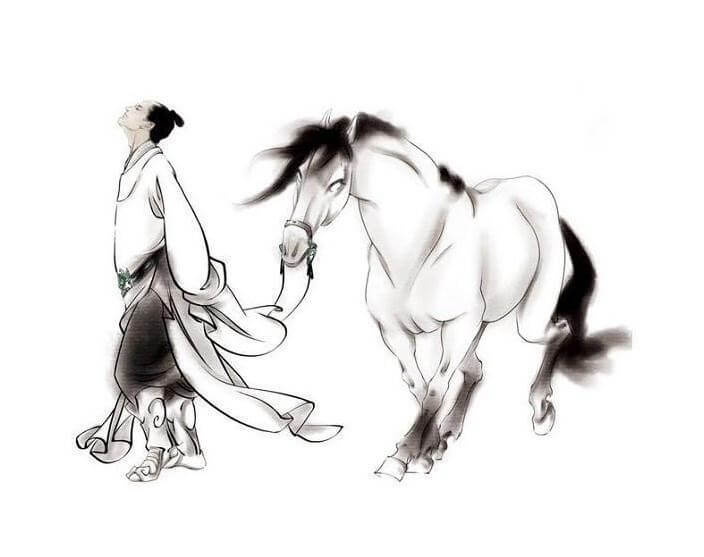A White Steed
- Poetry of Cao Zhi
《白马篇》Cao Zhi

A white steed harnessed with golden reins
Is galloping northwest across the plains.
If you should ask where the horseman will go,
He is a knight in Youzhou and Bingzhou.
Since he left home at an early age,
In the desert he's been known for his rage.
He holds a mighty bow day and night,
With arrows ready to be shot with might.
Now he hits the target with his left hand;
Now he shoots the centre with his left hand.
He raises his bow to hit a flying target;
He lowers his bow to shoot a standing target.
He is as deft as a monkey or an ape;
He is as brave as a leopard of lithe shape.
Urgent news from the borders comes one day
That invading Tartars are on their way.
When pressing orders reach him from the north,
To the highland positions he rides forth.
In the enemy camp he fights the Huns;
On the battlefield he fights the savage ones.
When he plunges himself into the strife,
Not a moment does he fear for his life.
He leaves his father and mother behind,
Dismisses his sons and wife out of his mind.
As his name is writ within the warrior book.
He never works for himself by hook or crook.
He'll sacrifice his life for native state;
E'en death is something of but little weight.
白马饰金羁,连翩西北驰。
借问谁家子,幽并游侠儿。
少小去乡邑,扬声沙漠垂。
宿昔秉良弓,楛矢何参差。
控弦破左的,右发摧月支。
仰手接飞猱,俯身散马蹄。
狡捷过猴猿,勇剽若豹螭。
边城多警急,虏骑数迁移。
羽檄从北来,厉马登高堤。
长驱蹈匈奴,左顾凌鲜卑。
弃身锋刃端,性命安可怀?
父母且不顾,何言子与妻!
名编壮士籍,不得中顾私。
捐躯赴国难,视死忽如归!
- Why Chinese poems is so special?
- The most distinctive features of Chinese poetry are: concision- many poems are only four lines, and few are much longer than eight; ambiguity- number, tense and parts of speech are often undetermined, creating particularly rich interpretative possibilities; and structure- most poems follow quite strict formal patterns which have beauty in themselves as well as highlighting meaningful contrasts.
- How to read a Chinese poem?
- Like an English poem, but more so. Everything is there for a reason, so try to find that reason. Think about all the possible connotations, and be aware of the different possibilities of number and tense. Look for contrasts: within lines, between the lines of each couplet and between successive couplets. Above all, don't worry about what the poet meant- find your meaning.
- A Song of the Spring Palace
- Poems on Army Life IV
- Poems on Army Life V
- West Palace, Autumn
- Hearing the River-Song
- The Lotus Gatherers